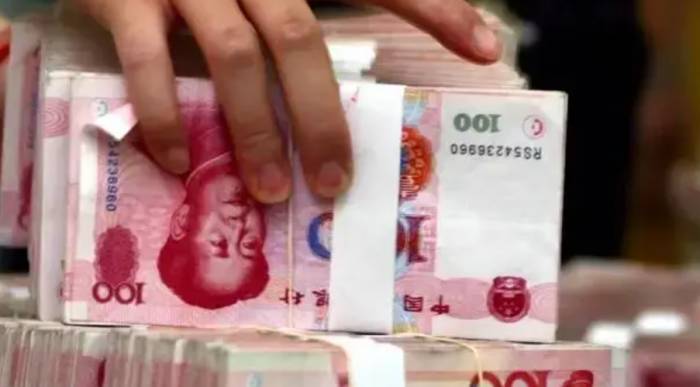Global Economic Storm: Chinese Buyers Retreat
The Federal Reserve's interest rate cut was accurately anticipated by the global market. The most pressing question for investors is how to preemptively avoid the Federal Reserve's harvesting actions to minimize losses. However, the Federal Reserve's harvesting techniques have become increasingly skilled. Don't think that by predicting the rate cut in advance, you can escape the Federal Reserve's blade.
When it comes to harvesting global assets, the Federal Reserve is a professional. Just a couple of days ago, our country was in the midst of the National Day holiday, with people across the nation enjoying their vacation. But in the United States, they were not idle, secretly gathering non-farm employment data for September, waiting to drop a bombshell in the market. What exactly is going on?
The Chinese yuan fluctuates, and global capital frantically pours into China.
The global financial market cannot escape the Federal Reserve's big knife. Some say that if the Federal Reserve sneezes, the global economy will shake along with it.
The United States is currently under tremendous inflationary pressure, with the unemployment rate of workers continuously rising. This is greatly related to the previous interest rate hikes in the United States. Continuous interest rate hikes increased the cost of financing, seemingly attracting global assets on the surface. But there must be an end to the interest rate hikes, right?
In September, the Federal Reserve finally couldn't hold back and released news of an interest rate cut. However, a rate cut is like a double-edged sword. If not handled well, the United States is very likely to hurt itself and harm global countries.
The Federal Reserve does not easily cut interest rates. Each rate cut represents a devaluation of dollar assets, and global dollar asset investors are watching the Federal Reserve's actions. This time, before the official news was released, there were signs of dollar assets being abandoned.
After the news was confirmed, the global economy finally ushered in a major storm.
China was also affected, especially with the fluctuation of the yuan exchange rate, which means the yuan is changing, and the yuan is appreciating while the dollar begins to depreciate.

From our Chinese perspective, after the yuan appreciates, it is beneficial to Chinese buyers. The purchasing power of the yuan is strengthened. In the international market, Chinese investors can buy a lot of assets, such as foreign stocks and real estate. But this time, Chinese buyers chose to retreat in large numbers, and did not rush to buy in a frenzy. This is because Chinese buyers sold American real estate and withdrew funds to the Chinese market.Some may wonder how this situation has arisen, with the decline in dollar assets and global buyers potentially scooping up bargains. Economic issues are not so straightforward; the global capital pool is vast, and the Federal Reserve could strike at any moment from behind the scenes. In the face of such circumstances, Chinese buyers must be cautious.
The appreciation of the yuan and the depreciation of the dollar have also affected the supply and demand relationships in the international market. Changes in currency exchange rates are part of market laws. Despite the decline in the value of dollar assets, global capital will still seek new investment areas.
For instance, those big players who invested in the United States are now starting to withdraw from the U.S. market to make money in the Chinese stock market.
Withdrawing from the U.S. is not enough; they also conveniently harvested 17 countries in the process.
Japan, the United Kingdom, Vietnam, India, Israel, Mexico, South Korea, South Africa, Sri Lanka, Pakistan, Brazil, and Indonesia, among others, have suffered severe blows to their stock markets due to this matter. Investments that were originally in these countries are also becoming restless. Since the Chinese stock market is so profitable now, everyone might as well run together.
Thus, a historic scene unfolded: a massive outflow of funds from the stock markets of these countries, especially with India and Japan suffering significant capital losses.
The Federal Reserve may pause interest rate cuts, throwing a big bomb into the market.
Global wealth has experienced significant fluctuations, with the Federal Reserve being behind the scenes. In the past two years, the U.S. debt deficit issue has been very severe, and the risk of financial bubbles has increased.
Faced with these issues, the Federal Reserve is most adept at using dollar tides, such as causing fluctuations in the U.S. dollar index and instability in the value of U.S. assets, leading to global capital turmoil and triggering financial crises in countries around the world. When other countries encounter crises, the United States naturally becomes safer.
In October, the Federal Reserve dropped a depth charge into the market. The Fed Chairman believes that the employment situation in the United States has improved, which is based on official U.S. employment statistics. Some investors predict that the Federal Reserve will continue to aggressively cut interest rates next.The Federal Reserve's recent stance has sent a signal to the capital markets that there is no urgency to rapidly cut interest rates. Following the release of this information, U.S. assets have quickly suffered significant damage, and global investors have accelerated their pace of abandoning dollar-denominated assets.
Every time there is a fluctuation in the global financial markets, the Federal Reserve is involved, indicating that it is indeed not a passive player.
The international financial situation is overly complex, and Chinese buyers have not immediately followed the Federal Reserve's rhythm. Instead, they have chosen to retreat from the U.S. market and return to the Chinese market. This decision is greatly related to our country's proper response.
Now, with the appreciation of the Chinese yuan and the booming Chinese stock market, investing in the Chinese market is a trend. Previously, 17 countries were still in their economic recovery phase, but the Federal Reserve's operations directly interrupted the pace of the U.S. economic recovery, inadvertently benefiting the Chinese market.
Leave a Reply